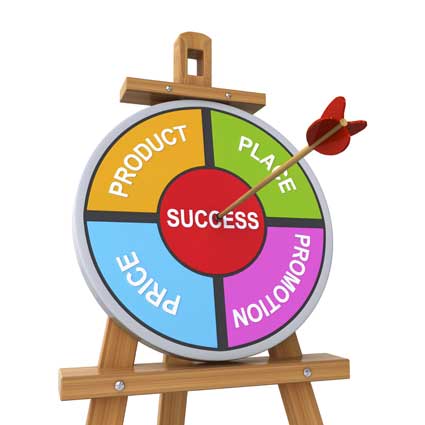Jane Smith has been in the sales department at her company for seven years. She's been passed over for the promotion to sales manager a dozen times even though she possesses all the skills and education required for the job. She doesn't understand why her boss keeps on overlooking her. Jane is a good employee and good at her job. In fact, she's the top salesperson in her department for four years running. Knowing that, she expects the company to want to promote her, but yet nothing. Her career isn't moving forward, and she doesn't know why.
The Importance of a Career Track
Your career track can be simply defined as where your career is going � and where you want to take it. The career track you decide on will be based on how you define success over the long term. Think about your career now, and where you are in your career. Where do you need your career to be in five years in order to be successful? Where do you need to be in 10?
Keeping your career on track requires managing your career from the very minute that you start planning it. At the very moment where you take action and put that plan into effect, you should also start managing your career and planning your career track.
Having a hands-off attitude and waiting for your career to gain momentum on its own never works. Your career is something you need to manage from the time it starts until the time you retire. To manage your career, you need to know the track you want your career to take. Your career track may detail how you want to move up within a company. However, it doesn't have to be company-specific. Sometimes managing your career means finding a job with a different company. It all depends on the track you want to be on.
Let's look at Jane's story again:
Jane Smith has been in the sales department at her company for seven years. She's been passed over for the promotion to sales manager a dozen times even though she possesses all the skills and education required for the job. She doesn't understand why her boss keeps on overlooking her. Jane is a good employee and good at her job. In fact, she's the top salesperson in her department for four years running. Knowing that, she expects the company to want to promote her, but yet nothing. Her career isn't moving forward, and she doesn't know why.
Now, after reading it again, how do we know Jane doesn't have a career track? So far in this article, we've assumed it, but now let's examine why.
Obviously, Jane wants to be promoted to sales manager. If she'd had a career track, perhaps she would have decided that she wanted to be the top salesperson after three years with the company and a sales manager by five years. That would have been how she defined success in her career, and she would have managed her career in a way to make those things happen.
Again, if she'd had a career track, she might have started looking for sales manager positions with other companies. She would have been managing her career the entire time instead of letting the company do it for her.
It's important to have a career track so you always know where you want your career to go, what the next step is, and what you need to do to get it there. Without a career track, you're flying blind. You're depending on the company you work for and your bosses to advance your career for you. Using that method, you may get some promotions and your career may advance somewhat, but your career will never reach the heights that you may want or envision. Managing your career is all on you. Creating a career track is an important part.
About Skills and Knowledge Portfolios
Typically, we think of portfolios as something writers and artists need. However, a skills and knowledge portfolio (or career portfolio) is something every career-minded individual needs to create and maintain over the course of their entire career. It should start when you start training or going to school in order to begin your career.
A skills and knowledge portfolio is a physical collection of your abilities, knowledge, and skills. It represents what you've accomplished in your career, and it shows your potential. It gives potential and current employers evidence of what you have done and, in turn, what you can do.
A skills and knowledge portfolio can help you:
-
Communicate your skills, knowledge, interests, and motivation.
-
Develop an action plan, then follow through with it.
What Should Go Into a Skills and Knowledge Portfolio
There are a lot of different things that you'll want to put into your portfolio. However, it starts with education.
You'll want to include:
-
Transcripts
-
Course descriptions
-
Diplomas and CEUs, as well as certificates
-
Appraisals and assessments
-
Awards, honors, and club memberships
-
Internships
-
Any workshops and seminars you've attended
-
Independent learning
-
Special training
You'll also want to include your activities in your portfolio, such as leadership positions you've held, hobbies or interests, team sports that you play, or services you provide to the community (such as delivering meals to the elderly). You can also include public speaking and awards you've received for activities.
The meat and potatoes, so to speak, of your career portfolio will be your work-related achievements as your career grows over time. You'll want to include:
-
Your resume
-
Jobs and positions held, including descriptions, supervisor, phone, and address)
-
Performance appraisals
-
Accomplishments (such as top salesperson)
-
Awards
-
Any licenses or certifications that you hold
-
Any major projects you've completed or participated in
-
Anything related to your work that you want to showcase as an achievement
Lastly, you'll want to include documentation of your strengths and qualities. These might include:
-
Strengths
-
People skills
-
Teamwork skills
Don't be afraid to include things like budgeting, planning, and organization. These are the strengths and qualities that will be valuable to an employer � and your career.
Developing a Career Track
Much like the career plan you created when you started your career, your career track will help you map out where you are now, as well as where you want to go in the future. You don't want to be like Jane (in our example) and leave your career in the hands of other people or never reach the level of success you envision.
The first step to developing your career track is knowing your vision, as well as your purpose. In the next paragraph, we'll talk about goal setting. However, even if you don't set specific goals, it's important to know what you want to accomplish. Having that vision and knowing your purpose will help to lead you in the right direction on your career.
Developing a career track also means writing down goals, then putting action plans in place to achieve them. The goals can be those you want to achieve in the immediate future, in a year, in five years, in 10 years -- you get the idea.
You should list all the goals you have for your career. And remember, they're not set in stone. When you evaluate your career track, you can always change direction and create new goals, if you want.
Ask yourself these questions to help establish your goals:
-
What kind of responsibility do you want to have?
-
What types of projects would like to be in charge of?
-
What results do you want to achieve in your department, and in your company?
-
Is there a certain type of company you want to work for?
-
Are there any problems or interests that you want to focus your entire career on?
-
What type of work environment do you prefer?
-
What type of people do you enjoy working with?
-
What salary do you desire?
-
What work/life balance works best for you?
Assessing Your Career Track
You should regularly monitor your career track. During these times, you can make sure you are indeed "staying on track," but you can also adjust your career track if you want to take a different direction with your career. You can also see the progress you've made, then plan what you need to do next.
-
When you monitor your career track, you're going to ask yourself questions like:
-
Are you where you want to be in your career? (Where you've planned to be)
-
Is it time to look for a new job in order to advance your career, or do you want to learn new skills at your current job?
Take a look at the goals you've created for yourself.
-
Have you met your goals?
-
If not, what prevented you from meeting them?
-
Has your vision for your career changed? If so, how?
Evaluating your career track means looking at the goals you've met or not met, but it also means asking yourself if you're heading in the direction you want � and what you might want to change or do differently in the future.

























